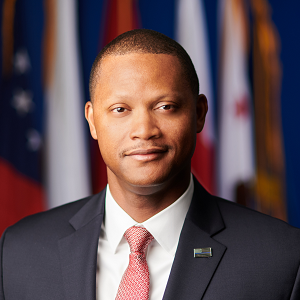Credit unions have always prioritized relationships and member service, but as technology reshapes financial services, the ability to lead with tech savvy has never been more important.
Many of today’s CEOs are blending technical expertise with cooperative values to build smarter, stronger partnerships with fintechs, from the big card and core processors to highly specialized startups pushing the envelope in innovation.
Here, in the first of a two-part series, four CEOs with technology backgrounds share how that experience shapes their leadership and their approach to fintech collaboration. They also offer practical insights for peers without a tech pedigree.
Mark Robnett, Justice FCU

Mark Robnett joined Justice FCU ($1.06B, Chantilly, VA) as vice president of IT in May 2013 and became its president and CEO in September 2018. Based in the Virginia suburbs, the cooperative serves more than 68,000 members of the justice, law enforcement, and public safety communities across the country, including in Washington, DC, Los Angeles, Atlanta, Chicago, and more.
How does your background in tech shape the way you lead and approach partnerships with fintechs?
Mark Robnett: It drives how we strategically manage fintech partnerships, of which we now have 27. I understand how AI, blockchain, and scalable cloud solutions can enhance both efficiency and member experience.
This knowledge helps us establish partnerships that deliver real value while safeguarding data and operations. It allows me to evaluate emerging technologies not just on their technical merits, but on how they integrate with our mission to serve members securely and effectively.
What should credit union leaders without a tech background consider when evaluating fintech collaboration, and is there a strategic imperative to develop tech fluency at the top?
MR: Focus on aligning fintech partnerships with your institution’s mission and member needs. It’s important to address specific challenges or capabilities that a fintech partnership can provide, rather than focusing on technology for its own sake.
Ensuring that the fintech’s ethos and solutions are consistent with the credit union’s values and commitment to member experience also is essential. Leaders should assess whether the fintech partnership will be disruptive or transformative and ensure it aligns with the credit union’s strategic objectives.
Developing tech fluency at the leadership level is crucial for long-term success in the digital-first era. This supports informed decision-making, strategic alignment, and fostering a culture of innovation within the credit union.
Chris Kearney, Truwest Credit Union

Chris Kearney joined TruWest Credit Union ( $1.7B, Tempe, AZ) as CIO in December 2012 and became its president and CEO last October. The 11-branch cooperative serves more than 90,000 members in four Arizona counties and two in Texas.
How does your background in tech shape the way you lead and approach partnerships with fintechs?
Chris Kearney: Growing up on the technology side of the business, I’ve learned to embrace change and help others navigate it. Technology creates both strategic opportunities and risks, and my role as a leader is to leverage both for the benefit of our members.
I also recognize that credit unions don’t have the R&D budgets of large banks like JPMorgan Chase. That’s why fintech partnerships are essential. We currently maintain a portfolio of over 10 fintech partnerships, representing about 20% of our tech stack. They give us access to advanced capabilities we couldn’t build on our own.
What should credit union leaders without a tech background consider when evaluating fintech collaboration, and is there a strategic imperative to develop tech fluency at the top?
CK: Inside the credit union, listen closely for pain points or opportunities that fintechs could address. At the same time, be mindful of where not to experiment. Core systems, digital banking platforms, and card networks are the “load-bearing walls” of your credit union and must be online 24×7. Fintech pilots should focus on areas where you can test and learn without disrupting critical infrastructure.
Not every leader needs to be a technologist, but we all need a shared vocabulary. Looking ahead, tech fluency is becoming just as essential as financial expertise in guiding our organizations forward.
More From TruWest Credit Union
Jim Morrell, Peninsula Community FCU

Jim Morrell has been president and CEO of Peninsula Community FCU ($300M, Shelton, WA) since May 2012 and has more than 30 years of credit union technology leadership experience, including senior roles with America’s Credit Unions’ Technology Council. His cooperative operates five branches on the Olympic Peninsula and serves more than 21,000 members.
How does your background in tech shape the way you lead and approach partnerships with fintechs?
Jim Morrell: Technology is always transforming the way we do business as a credit union; it always has. In order to remain competitive, we must continue to adapt. Things that are table stakes today, such as online banking, at one time were cutting-edge revolutions. My credit union at the time was issuing modems and floppy disks with software.
The pace of the technological transformation along with the real-time speed at which payments can take place is now coupling with generative AI potential to rock our worlds. This bring us to the challenge of today’s reality of us and our teams learning a lot quickly about how technological changes — call that fintech — affect what consumers expect and what we implement.
What should credit union leaders without a tech background consider when evaluating fintech collaboration, and is there a strategic imperative to develop tech fluency at the top?
JM: Any leader needs to understand their strengths and weaknesses based on their background and experiences. Once you have a handle on that, then you need to ensure that you have a team around you that can provide those insights and perspectives.
So, if a credit union leader does not have a tech background, you need to find someone that does. That person, however, does not necessarily need to be a technologist. It could be a lender or member experience expert with a technology understanding. Or it could be a technology leader that has member experience and lending familiarity. The latter is the path that I followed.
Chad Ritchie, Matanuska Valley FCU

Chad Ritchie took over as president and CEO at Matanuska Valley FCU ($951.3M, Palmer, AK) after 10 years as CIO at credit unions in California and Washington state. The 62,614-member, 11-branch institution recently expanded its charter to serve most communities in Alaska, and also has a presence in Hawaii.
How does your background in tech shape the way you lead and approach partnerships with fintechs?
Chad Ritchie:
I’ve worked with select fintech partners across credit unions, focusing on alignment over volume. Coming up through tech, I’ve always looked at such partnerships through the lens of scalability, speed, and stability, and I focus on alignment over volume.
I prioritize partnerships that improve member and employee experiences holistically, and that empower data ownership and thinking beyond legacy limitations. Successful partnerships are about more than technology, they’re about shared goals and a commitment to delivering meaningful outcomes for members.
What should credit union leaders without a tech background consider when evaluating fintech collaboration, and is there a strategic imperative to develop tech fluency at the top?
CR: The partnerships that stand out are those that improve member and employee experiences, think beyond legacy limitations, and show up as true collaborators committed to shared outcomes rather than just their own revenue goals.
Credit union leaders without a tech background should also focus on whether a fintech drives measurable, organization-wide impact beyond its own product, and be willing to ask the right questions with support from people who can translate, because tech fluency at your level is no longer optional.
Interviews have been edited and condensed
But wait, there’s more! For the other half of this series, including insights and tips from more credit unions, click here to read part 2.